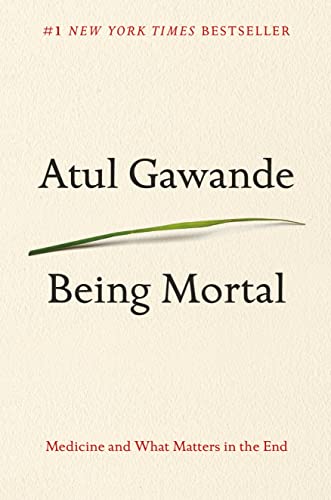Being Mortal: Medicine and What Matters in the End

#1 New York Times Bestseller
In Being Mortal, bestselling author Atul Gawande tackles the hardest challenge of his profession: how medicine can not only improve life but also the process of its ending
Medicine has triumphed in modern times, transforming birth, injury, and infectious disease from harrowing to manageable. But in the inevitable condition of aging and death, the goals of medicine seem too frequently to run counter to the interest of the human spirit. Nursing homes, preoccupied with safety, pin patients into railed beds and wheelchairs. Hospitals isolate the dying, checking for vital signs long after the goals of cure have become moot. Doctors, committed to extending life, continue to carry out devastating procedures that in the end extend suffering.
Gawande, a practicing surgeon, addresses his profession's ultimate limitation, arguing that quality of life is the desired goal for patients and families. Gawande offers examples of freer, more socially fulfilling models for assisting the infirm and dependent elderly, and he explores the varieties of hospice care to demonstrate that a person's last weeks or months may be rich and dignified.
Full of eye-opening research and riveting storytelling, Being Mortal asserts that medicine can comfort and enhance our experience even to the end, providing not only a good life but also a good end.
BUY THE BOOK
Community Reviews
What Bookclubbers are saying about this book
✨ Summarized by Bookclubs AI
Readers say *Being Mortal* offers profound insight into aging, illness, and end-of-life care, combining medical facts with deeply personal reflections...
"The simple view is that medicine exists to fight death and disease, that is, of course, its most basic task. Death is the enemy. But the enemy has superior forces. Eventually, it wins. And in a war that you cannot win, you don't want a general who fights to the point of total annihilation. You don't want Custer. You want Robert E. Lee, someone who knows how to fight for territory that can be won and how to surrender it when it can't. Someone who understand that the damage is greatest if all you do is battle to the bitter end.
More often, these days, medicine seems to supply neither Custers nor Lees. We are increasingly the generals who march the soldiers onward, saying all the while, 'You let me know when you want to stop.' All-out treatment, we tell the incurably ill, is a train you can get off at any time - just say when. But for most patients and their families we are asking too much. They remain riven by doubt and fear and desperation; some are deluded by a fantasy of what medical science can achieve. Our responsibility, in medicine, is to deal with human beings as they are. People die only once. They have no experience to draw on. They need doctors and nurses who are willing to have the hard discussions and say what they have seen, who will help people prepare for what is to come and escape a warehoused oblivion that few really want."
1. What are your biggest fears and concerns?
2. What goals are most important to you?
3. What trade-offs are you willing to make, and what ones are you not?
thenextgoodbook.com
Being Mortal by Atul Gawande
263 pages
What’s it about?
This book explores, from a physician’s viewpoint, how the medical field is influencing the way our lives end- in illness and in old age.
What did it make me think about?
I cannot overstate how important I thought this book was. It was such a fascinating look at the way we make decisions for the elderly and the very ill. Dr. Atul Gawande steers us through this difficult terrain with wisdom and grace.
Should I read it?
I think this book was a must read for anyone who is dealing with aging or death. Basically, that means everyone… I felt like this book radically changed my perspective. It changed how I will frame the discussions I have with my family. How often does a book do that?
Quote-
“The problem with medicine and the institutions it has spawned for the care of the sick and the old is not that they have had an incorrect view of what makes life significant. The problem is that they have had almost no view at all. Medicine’s focus is narrow. Medical professionals concentrate on repair of health, not sustenance of the soul. Yet- and this is the painful paradox- we have decided that they should be the ones who largely define how we live in our waning days. For more than a half a century now, we have treated the trials of sickness, aging, and mortality as medical concerns. It’s been an experiment in social engineering, putting our fates in the hands of people valued more for their technical prowess than for their understanding of human needs.
That experiment has failed. If safety and protection were all we sought in life, perhaps we could conclude differently. But because we seek a life of worth and purpose, and yet are routinely denied the conditions that might make it possible, there is no other way to see what modern society has done.”
Question-
Did you feel like this book changed your viewpoint?
See why thousands of readers are using Bookclubs to stay connected.